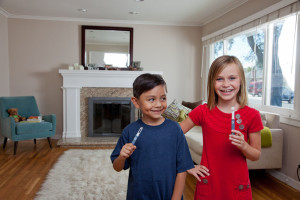Your child hasn’t reached the speech and language milestones as quickly as her buddies. And, she says “thoup” instead of “soup”. Does this mean she has a speech impediment? Does she need speech therapy? Will she outgrow it on her own? Parents whose children are at the beginning stages of speech and language development ask these questions and more as their children’s speech patterns emerge. There are no real clinical “tests” to determine whether or not your child is a late talker, has a real speech impediment, or if it will indeed resolve itself on its own. Many children with early speech impairments do eventually outgrow them by the time they are ready for kindergarten. It is important to discuss your concerns with your child’s healthcare provider for any developmental challenges as there are also many other causes and types of speech disorders.
Continue reading
Understanding Speech Impediments in Children
Articulation Disorders Language Development News Parents' Corner Pronunciation & Lisps Speech Disorders Speech Therapist Speech Therapy TechniquesHow do you know if your child has a speech impediment? Speech impediments in children are more common than you might think. They are a type of communication disorder where “normal” speech is disrupted. The disruption can include a lisp, stuttering, stammering, mis-articulation of certain sounds and more. Another commonly used phrase for speech impediments in children is speech disorder. Often, the causes of a speech impediment are unknown. However, sometimes there are physical impairments such as cleft palate or neurological disorders such as traumatic brain injury that may be the cause of the speech impairment. We have listed below five of the most common types of speech impediments in children and a general description of each. Of course, if you suspect your child may have a speech impairment of any kind, we encourage you to visit your pediatrician or hire a Speech Therapist for more information.
Three Valentine’s Day Activities For Your Kids
Articulation Disorders Arts and Crafts At Home Ideas Language Development Parents' Corner School Speech Disorders Speech Therapy TechniquesIn the spirit of Valentine’s Day, we want to share with you three fun ideas to celebrate Valentine’s Day with your students and kids! Of course, you can pull out some arts and crafts, stickers and colored paper to make homemade cards, but we’ve gone a bit further with some crafty and creative ways to get your involved with your kids, and provide an opportunity for language building and speech therapy techniques. We gathered these activities from some of our favorite Speech Therapy websites, so, grab your scissors, paper and tape and get ready for some Valentine’s Day fun!
Are Tactile Tools for Speech Therapy An Effective Option?
Apps Articulation Disorders At Home Ideas Parents' Corner School Speech Disorders Speech Therapist Speech Therapy Techniques
Our in-depth look at tools for speech therapy turns toward non-traditional speech therapy methods today. We have touched on terrific apps for families and children with articulation disorder and sites and resources for SLP’s looking to incorporate technology into their practice. Another piece of speech therapy worth discussing are hand-held, tactile tools. Hand-held items are often effective tools for speech therapy. Tactile tools target a range of skill sets from fine and gross motor, articulation, voice and stuttering, listening and sensory skills. Tactile tools allow kids to practice speech sounds, provide appropriate sensory options and can be used in any setting, whether it be home, at a speech therapist’s office or even at school.
Tools for Speech Therapy: 5 Fabulous Apps for Kids
Apps Articulation Disorders At Home Ideas Language Development Parents' Corner Speech delay Speech Disorders Speech Therapist Speech Therapy TechniquesGet your iPads ready! Games, puzzles, stories on the go? Speech Therapy is no longer one size fits all. Recent innovations in technology provide many valuable tools for speech therapy. Apps, iPad games and gadgets offer opportunities for learning at every level of speech therapy and often help make the therapy fun. Of course, apps should not be viewed as a replacement for a comprehensive speech therapy plan, and you should always seek to contact your SLP if you are planning to use applications, games and gadgets in conjunction with your therapy sessions.




